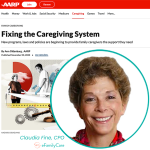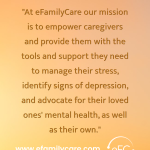
Caring for a physically, psychological or cognitive impaired person is a huge responsibility and those new to this responsibility may go through a challenging period of adjustment. These five tips can help with the transition, enhance successful caregiving and ensure the well-being of both the Aging Loved One and the Family Caregiver.
1. Find a support group
If you are a primary caregiver, finding support groups in your area can be very helpful. It can be very beneficial if you commit to attending a meeting at least once per month. This will be an opportunity to get out of the house and meet other people who are in a similar situation. Support groups are an excellent place to air grievances and to learn healthy tips for dealing with your new role so you can best support your loved one.
2. Don’t be afraid to ask for help
Asking for help can be hard for many people. Many Family Caregivers feel that they should be able to do everything themselves as evidence of their caring and commitment to their Aging Loved One. This couldn’t be farther from the truth. Some feel intimidated to reach out for help. Taking the steps to reach out for support when needed will benefit both the caregiver and the person being cared for. Historically, support for Family Caregivers has been limited. Healthcare professionals and institutions have not recognized the critical role Family Caregivers play in the health care outcomes of their patients and have failed to provide information and guidance. eFamilyCare was created to bridge this gap, offering professional support for family caregivers. This level of support leads to less stress for caregivers and better outcomes for those receiving care.
3. Take care of yourself
It is extremely easy for caregivers to lose themselves and their connections to others in the process of caring for an Aging Loved One. This can contribute to isolation which is a precursor to burnout. It is vital that caregivers take time for themselves and establish a self-care routine. This will look different for each person but may involve a daily walk outside, going out to dinner with friends, or a monthly spa day. Taking care of yourself is not selfish — in fact, it is important to be healthy and well taken care of in order to best care for others.
4. Set boundaries
Although setting boundaries can be difficult, especially for a Family Caregiver, failing to do so can lead to feelings of resentment, social isolation and ultimately burnout. An example of boundary setting might be finding a couple of hours to yourself each day, a night out once a week, or even delegating personal caregiving to a paid caregiver. Arranging and sticking to set boundaries will lead to a healthier caregiver relationship.
5. Learn how to communicate with doctors
As a family caregiver, you may be the main point of contact with your Aging Loved One’s doctors, a nursing home, or a social entitlement program. One of the most challenging learning curves will be how to best communicate with these providers. eFamilyCare’s best tip is to prepare for each visit with a profession and bring a written list of information and questions. Take notes as you are caring so nothing is forgotten. This will help you easily access information, make your interaction more productive and empower you to realize your caregiving goals.
Get the support you need as a new caregiver
As a new caregiver, you will need all the support you can get in order to best serve yourself and your Aging Loved One. eFamilyCare is here to empower you to be the most effective in your role and to ensure that you do not compromise your own well-being in the process. Contact us today to let us help you navigate your caregiving journey successfully.







